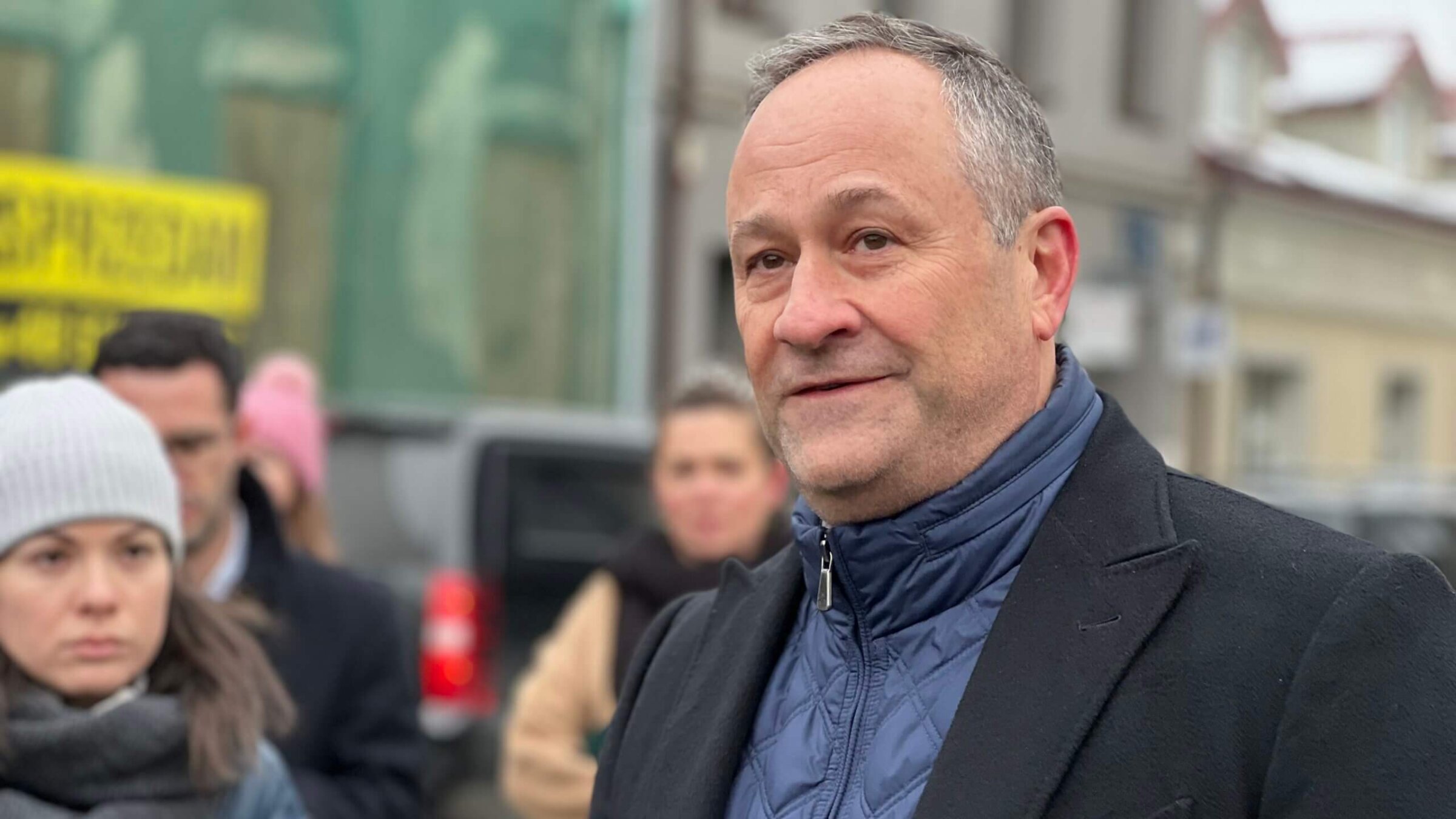What I learned about Doug Emhoff by traveling with him to Auschwitz
I’m naturally skeptical of politicians. Emhoff’s candor — and love for his wife — won me over

Second gentleman Doug Emhoff, speaking during a visit to Kazimierz, Poland. Photo by Laura E. Adkins
Laura E. Adkins, former opinion editor of the Forward, traveled to Poland and Germany with second gentleman Doug Emhoff in early 2023.
With Vice President Kamala Harris all but anointed as the new Democratic nominee for president, Doug Emhoff, the first-ever second gentleman, could again make history, as the first first gentleman and the first Jewish spouse of an American president. Which has renewed a question I’ve been asked often since spending a week covering the man’s visit to Poland and Germany last year: What is Doug Emhoff like?
As a journalist, I am naturally skeptical of politicians. I was ready to dislike Emhoff before we departed on the trip marking the 2023 International Holocaust Remembrance Day — or at least prepared for a string of hollow statements of solidarity with Jews. But after traversing difficult places and conversations with Emhoff — both during that trip and at a handful of official events since, including the first-ever vice presidential Rosh Hashanah party — this is how I answer the question:
Doug Emhoff is a mensch. He is deeply in love with his wife, which should count for something no matter what you think of her or the Biden-Harris administration’s policies. He is refreshingly candid and emotionally expressive.
Thrust into a role he never asked for as a spokesman of the Jews and against antisemitism, Emhoff has handled the impossible role with grace.
Doug Emhoff is human
I get the distinct impression that Emhoff really misses his civilian life. Like most attorneys, he can drink: Having enjoyed several rounds with him, I can confidently say he passes the “would I want to have a beer with this person” political test.
Over those drinks, during the week he spent traversing Poland and Germany with five journalists in tow, he was candid about his own personal shortcomings and talked openly about his experiences. Nearly every evening of the trip, he schmoozed with us — off the record — at various hotel bars and local haunts, speaking about his family, his impressions of the harrowing places we visited, and his relationship to politics and the donor class.
Emhoff takes pride in the role he gets to play in the administration. He was careful about expressing any political opinions or policies, but was refreshingly open on all other subjects.
He is in touch with his emotions
I had never been to Poland before covering Emhoff and Ambassador Deborah Lipstadt’s trip, and wasn’t sure how I’d absorb the visit to Auschwitz, especially. I still am not quite sure, 18 months later, what it all meant to me personally.
But watching Emhoff at site after site of mass atrocity, and watching him tear up while visiting his ancestral hometown in Gorlice, represented a quintessentially American Jewish experience:
He at once expressed a desire to connect to the place from which his ancestors had come and sorrow for what had been destroyed there; a deep unease that the victims were not the ones writing the story of what happened; and the gratitude — common among descendants of immigrants — that his family had been among the ones who escaped before it was too late.
There was a palpable sense of relief on Emhoff’s face when we boarded the plane from Poland to Germany, leaving behind a country that has long avoided taking responsibility for the antisemitism that festers within it for one that has fully reckoned with its past.
It was this, I think, that captured the essence of Emhoff: a man with an appreciation for his circumstances who is focused primarily on what comes next. In Poland, he seemed much more interested in speaking with the Ukrainian refugees doing arts and crafts at a local community center than he was impressed by the dignitaries and officials at every stop.
Doug Emhoff’s Judaism
Like many American Jews, Emhoff never thought that hard about his Judaism before he became the first Jewish spouse of an American president or vice president and thus was asked about it all the time.
He went to a Jewish summer camp, Cedar Lake, and often recounts with a smile how he was voted “most athletic” there. He became a bar mitzvah at Temple Shalom in Aberdeen, New Jersey. But his first wife wasn’t Jewish, and their children do not identify as Jewish.
While he would have preferred to focus on women’s rights and generally supporting the administration, President Joe Biden pushed him to embrace the role of First Jew.
It’s one he’s filled admirably.
A few months after our trip, the Biden administration released the nation’s first official strategy to counter antisemitism. At the Rosh Hashanah gathering at the vice president’s residence last fall, I told Emhoff that I appreciated his mention of “direct and concrete actions” the administration had taken to combat antisemitism. He quipped that his remarks “had the benefit of being true.”
So much has changed since then. The Oct. 7 terror attack and ensuing war, Biden’s precipitous cognitive decline and decision, on Sunday, not to seek reelection.
It’s far too soon to say what a Harris campaign or administration would mean for American Jews and the issues we care about. One thing I do know is that she’ll have a genuine, honest, whip-smart partner standing by her side no matter the outcome.

















